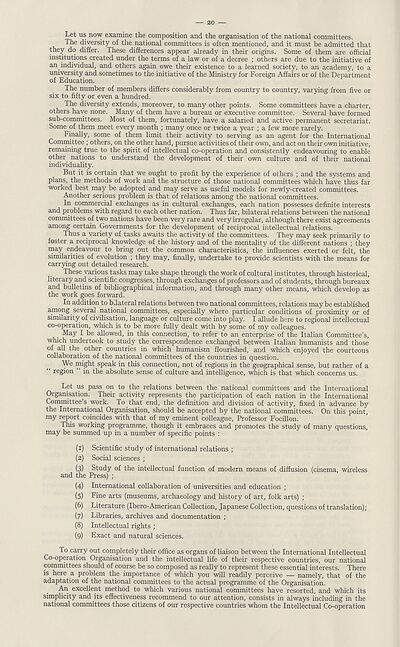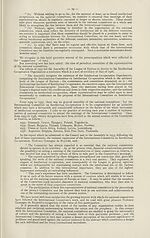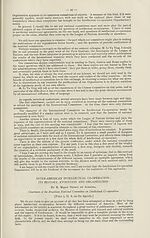International > Proceedings of the second General conference of national committees on intellectual co-operation, Paris, July 5th-9th, 1937
(22)
Download files
Complete book:
Individual page:
Thumbnail gallery: Grid view | List view

— 20 —
Let us now examine the composition and the organisation of the national committees.
The diversity of the national committees is often mentioned, and it must be admitted that
they do differ. These differences appear already in their origins. Some of them are official
institutions created under the terms of a law or of a decree ; others are due to the initiative of
an individual, and others again owe their existence to a learned society, to an academy, to a
university and sometimes to the initiative of the Ministry for Foreign Affairs or of the Department
of Education.
The number of members differs considerably from country to country, varying from five or
six to fifty or even a hundred.
The diversity extends, moreover, to many other points. Some committees have a charter,
others have none. Many of them have a bureau or executive committee. Several have formed
sub-committees. Most of them, fortunately, have a salaried and active permanent secretariat.
Some of them meet every month ; many once or twice a year ; a few more rarely.
Finally, some of them limit their activity to serving as an agent for the International
Committee ; others, on the other hand, pursue activities of their own, and act on their own initiative,
remaining true to the spirit of intellectual co-operation and consistently endeavouring to enable
other nations to understand the development of their own culture and of their national
individuality.
But it is certain that we ought to profit by the experience of others ; and the systems and
plans, the methods of work and the structure of those national committees which have thus far
worked best may be adopted and may serve as useful models for newly-created committees.
Another serious problem is that of relations among the national committees.
In commercial exchanges as in cultural exchanges, each nation possesses definite interests
and problems with regard to each other nation. Thus far, bilateral relations between the national
committees of two nations have been very rare and very irregular, although there exist agreements
among certain Governments for the development of reciprocal intellectual relations.
Thus a variety of tasks awaits the activity of the committees. They may seek primarily to
foster a reciprocal knowledge of the history and of the mentality of the different nations ; they
may endeavour to bring out the common characteristics, the influences exerted or felt, the
simila.rities of evolution ; they may, finally, undertake to provide scientists with the means for
carrying out detailed research.
These various tasks may take shape through the work of cultural institutes, through historical,
literary and scientific congresses, through exchanges of professors and of students, through bureaux
and bulletins of bibliographical information, and through many other means, which develop as
the work goes forward.
In addition to bdateral relations between two national committees, relations may be established
among several national committees, especially where particular conditions of proximity or of
similarity of civilisation, language or culture come into play. I allude here to regional intellectual
co-operation, which is to be more fully dealt with by some of my colleagues.
May I be allowed, in this connection, to refer to an enterprise of the Italian Committee’s,
which undertook to study the correspondence exchanged between Italian humanists and those
of all the other countries in which humanism flourished, and which enjoyed the courteous
collaboration of the national committees of the countries in question.
speak in this connection, not of regions in the geographical sense, but rather of a
" region ” in the absolute sense of culture and intelligence, which is that which concerns us.
Let us pass on to the relations between the national committees and the International
Organisation. Their activity represents the participation of each nation in the International
Committee s work. To that end, the definition and division of activity, fixed in advance by
the International Organisation, should be accepted by the national committees. On this point,
my report coincides with that of my eminent colleague, Professor Focillon.
This working programme, though it embraces and promotes the study of many questions,
may be summed up in a number of specific points :
(1) Scientific study of international relations ;
(2) Social sciences ;
(3) Study of the intellectual function of modern means of diffusion (cinema, wireless
and the Press) ;
(4) International collaboration of universities and education ;
(5) Fine arts (museums, archaeology and history of art, folk arts) ;
(6) Literature (Ibero-American Collection, Japanese Collection, questions of translation);
(7) Libraries, archives and documentation ;
(8) Intellectual rights ;
(9) Exact and natural sciences.
To carry out completely their office as organs of liaison between the International Intellectual
Co-operation Organisation and the intellectual life of their respective countries, our national
committees should of course be so composed as really to represent these essential interests. There
is here a problem the importance of which you will readily perceive — namely, that of the
adaptation of the national committees to the actual programme of the Organisation.
An excellent method to which various national committees have resorted, and which its
simplicity and its effectiveness recommend to our attention, consists in always including in the
national committees those citizens of our respective countries whom the Intellectual Co-operation
Let us now examine the composition and the organisation of the national committees.
The diversity of the national committees is often mentioned, and it must be admitted that
they do differ. These differences appear already in their origins. Some of them are official
institutions created under the terms of a law or of a decree ; others are due to the initiative of
an individual, and others again owe their existence to a learned society, to an academy, to a
university and sometimes to the initiative of the Ministry for Foreign Affairs or of the Department
of Education.
The number of members differs considerably from country to country, varying from five or
six to fifty or even a hundred.
The diversity extends, moreover, to many other points. Some committees have a charter,
others have none. Many of them have a bureau or executive committee. Several have formed
sub-committees. Most of them, fortunately, have a salaried and active permanent secretariat.
Some of them meet every month ; many once or twice a year ; a few more rarely.
Finally, some of them limit their activity to serving as an agent for the International
Committee ; others, on the other hand, pursue activities of their own, and act on their own initiative,
remaining true to the spirit of intellectual co-operation and consistently endeavouring to enable
other nations to understand the development of their own culture and of their national
individuality.
But it is certain that we ought to profit by the experience of others ; and the systems and
plans, the methods of work and the structure of those national committees which have thus far
worked best may be adopted and may serve as useful models for newly-created committees.
Another serious problem is that of relations among the national committees.
In commercial exchanges as in cultural exchanges, each nation possesses definite interests
and problems with regard to each other nation. Thus far, bilateral relations between the national
committees of two nations have been very rare and very irregular, although there exist agreements
among certain Governments for the development of reciprocal intellectual relations.
Thus a variety of tasks awaits the activity of the committees. They may seek primarily to
foster a reciprocal knowledge of the history and of the mentality of the different nations ; they
may endeavour to bring out the common characteristics, the influences exerted or felt, the
simila.rities of evolution ; they may, finally, undertake to provide scientists with the means for
carrying out detailed research.
These various tasks may take shape through the work of cultural institutes, through historical,
literary and scientific congresses, through exchanges of professors and of students, through bureaux
and bulletins of bibliographical information, and through many other means, which develop as
the work goes forward.
In addition to bdateral relations between two national committees, relations may be established
among several national committees, especially where particular conditions of proximity or of
similarity of civilisation, language or culture come into play. I allude here to regional intellectual
co-operation, which is to be more fully dealt with by some of my colleagues.
May I be allowed, in this connection, to refer to an enterprise of the Italian Committee’s,
which undertook to study the correspondence exchanged between Italian humanists and those
of all the other countries in which humanism flourished, and which enjoyed the courteous
collaboration of the national committees of the countries in question.
speak in this connection, not of regions in the geographical sense, but rather of a
" region ” in the absolute sense of culture and intelligence, which is that which concerns us.
Let us pass on to the relations between the national committees and the International
Organisation. Their activity represents the participation of each nation in the International
Committee s work. To that end, the definition and division of activity, fixed in advance by
the International Organisation, should be accepted by the national committees. On this point,
my report coincides with that of my eminent colleague, Professor Focillon.
This working programme, though it embraces and promotes the study of many questions,
may be summed up in a number of specific points :
(1) Scientific study of international relations ;
(2) Social sciences ;
(3) Study of the intellectual function of modern means of diffusion (cinema, wireless
and the Press) ;
(4) International collaboration of universities and education ;
(5) Fine arts (museums, archaeology and history of art, folk arts) ;
(6) Literature (Ibero-American Collection, Japanese Collection, questions of translation);
(7) Libraries, archives and documentation ;
(8) Intellectual rights ;
(9) Exact and natural sciences.
To carry out completely their office as organs of liaison between the International Intellectual
Co-operation Organisation and the intellectual life of their respective countries, our national
committees should of course be so composed as really to represent these essential interests. There
is here a problem the importance of which you will readily perceive — namely, that of the
adaptation of the national committees to the actual programme of the Organisation.
An excellent method to which various national committees have resorted, and which its
simplicity and its effectiveness recommend to our attention, consists in always including in the
national committees those citizens of our respective countries whom the Intellectual Co-operation
Set display mode to:
![]() Universal Viewer |
Universal Viewer | ![]() Mirador |
Large image | Transcription
Mirador |
Large image | Transcription
Images and transcriptions on this page, including medium image downloads, may be used under the Creative Commons Attribution 4.0 International Licence unless otherwise stated. ![]()
| League of Nations > International > Proceedings of the second General conference of national committees on intellectual co-operation, Paris, July 5th-9th, 1937 > (22) |
|---|
| Permanent URL | https://digital.nls.uk/195217461 |
|---|
| Shelfmark | LN.XII |
|---|
| Description | Over 1,200 documents from the non-political organs of the League of Nations that dealt with health, disarmament, economic and financial matters for the duration of the League (1919-1945). Also online are statistical bulletins, essential facts, and an overview of the League by the first Secretary General, Sir Eric Drummond. These items are part of the Official Publications collection at the National Library of Scotland. |
|---|---|
| Additional NLS resources: |
|

